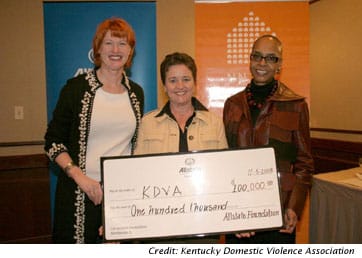
 (WOMENSENEWS)–The Kentucky Domestic Violence Association has extended interest-free microloans to 41 women throughout its 15 member organizations since 2009. The loans are pegged to savings accounts that match every dollar saved with two dollars, doubling the financial lift.
(WOMENSENEWS)–The Kentucky Domestic Violence Association has extended interest-free microloans to 41 women throughout its 15 member organizations since 2009. The loans are pegged to savings accounts that match every dollar saved with two dollars, doubling the financial lift.
While the interest-free loan is truly micro–typically between just $200 and $800 –it can provide a crucial financial boost, enough to help a woman fleeing abuse meet the first month’s rent on an apartment or pay for transportation to a new job. At the same time it can protect her from a predatory or "payday" lender that can charge interest rates that go as high as 400 percent, taken annually.
Microloans for battered women are still a rarity.
But what’s even more notable about this program, funded by over $200,000 in grants from the Allstate Foundation of Northbrook, Ill., is that survivors are getting their repayments monitored by credit bureaus that usually won’t report these types of non-traditional loans.
That means the women not only get crucial cash in hand, their repayments are also helping to generate and improve credit scores, essential for such personal-finance basics as renting an apartment or buying a car.
Credit Builders Alliance
The safety advocacy group has managed to report their microloans to credit bureaus by working through the Credit Builders Alliance, a 4-year-old Washington-based group assisting the nonprofits that serve low- to moderate-income individuals to build their credit and access conventional financing.
"They did all the heavy lifting," said Mary O’Doherty, economic empowerment director for the Kentucky Domestic Violence Association, based in Frankfort, in a telephone interview.
Vikki Frank is founder and executive director of Credit Builders Alliance.
"What we’ve learned from working with the Kentucky Domestic Violence Association is that in many domestic-violence households women aren’t in control of the finances," Frank said in an interview with Women’s eNews at a New York City brasserie. "They often don’t have their names on the utilities, mortgage, credit cards or bank accounts. So these credit lines go even further in helping domestic violence survivors to become economically self-sufficient by establishing credit as an asset with accounts in their names."
The Credit Builders Alliance has 100 members that offer microloans. All the loans are reported to Experian, based in Costa Mesa, Calif., and TransUnion of Chicago, two of the three major credit bureaus. Equifax, based in Atlanta, does not work with the Credit Builders Alliance.
So far, Kentucky Domestic Violence Association is the only member of the alliance that acts as a lender to women escaping abusive homes.
One other member, Building Security Through Assets and Financial Education in Helena, Mont., arranges loans for women escaping domestic violence by referring them to local credit unions. So far, however, that project has only extended one micro loan since 2004.
Borrowers Build Collateral
In the Kentucky program women make contributions to an "individual development account" for at least six months before qualifying for a micro loan that can be no more than the amount in the individual development accounts. The accounts serve as the borrower’s collateral, with their deposits matched by money from Allstate Foundation grants to the Kentucky organization’s economic empowerment project. Accounts can grow to a maximum of $6,000, with $4,000 of that coming from the Allstate funds.
Among the 41 recipients of the Kentucky Domestic Violence-Allstate program, about one quarter began with no credit history.
In a year of lending, approximately 15 borrowers have increased their credit scores by 50 points. Two have increased scores by 105 and 126 points. Only three women have missed payments on the loans.
"The biggest improvement in credit scores we see are when a borrower uses our microloans in conjunction with other forms of credit such as a credit card," said O’Doherty. "We see the biggest jump in scores when they make payments on time to all creditors, including the domestic violence organization."
When a borrower misses payments it must be reported, but no penalty exists, said O’Doherty. After three consecutive missed payments, the Kentucky group simply pays off the remainder of the loan from funds in the borrower’s savings account and reports the loans as paid back early, in full.
"Missed payments don’t have as negative an impact on credit scores as defaults do, and because of how we set up the program, no women will ever default," explained O’Doherty.
If a borrower repays the loan in full, the money in her individual account is still there, along with the funds that have been matched.
Regina Varolli is a freelance writer and editor based in Manhattan, and the owner of Words by Regina Varolli and Co. She blogs about food at Culinary Sagacity.
For more information:
Credit Builders Alliance
http://www.creditbuildersalliance.org/
Kentucky Domestic Violence Association
http://www.kdva.org/index.php
The Allstate Foundation
http://www.allstate.com/foundation.aspx
Note: Women’s eNews is not responsible for the content of external Internet sites and the contents of site the link points to may change.


